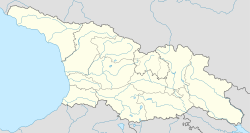Baghdati
|
Baghdati ბაღდათი |
|
|---|---|
| Town | |
| Baghdati | |
| Coordinates: 42°04′14″N 42°49′26″E / 42.070599°N 42.823961°ECoordinates: 42°04′14″N 42°49′26″E / 42.070599°N 42.823961°E | |
| Country | Georgia |
| Region | Imereti |
| District | Baghdati |
| Elevation | 250 m (820 ft) |
| Population (2009) | |
| • Total | 4,800 |
| Time zone | Georgian Time (UTC+4) |
| Climate | Cfa |
Baghdati (Georgian: ბაღდათი) is a town of 4,800 people in the Imereti region of western Georgia, at the edge of the Ajameti forest on the river Khanistsqali, a tributary of the Rioni.
The town is located at the edge of the Ajameti forest on the left bank of the Khanistsqali River, about 170 kilometres (110 mi) west-northwest of Tbilisi and 25 kilometres (16 mi) south-southeast of Kutaisi.
The climate of Baghdati can be classified as moderately humid subtropical (Köppen climate classification Cfa).
Baghdati is one of the oldest villages in the historical Imereti region. Its name shares the same origins as the name of the capital of Iraq, Baghdad: هدیه Bag "god" and خدا dāti "given", which can be translated as "God-given" or "God's gift" in old Persian. When Georgia was part of the Russian Empire and during the Georgian Soviet Socialist Republic, its name was changed to Baghdadi (Russian: Багдади). In 1940, it was renamed Mayakovsky (Georgian: მაიაკოვსკი; Russian: Маяковский), after the poet Vladimir Mayakovsky who was born here in 1893. In 1981, Mayakovsky was granted town status. In 1991, slightly modified original name was restored.
In Baghdati there is a furniture factory and companies in the food industry (canned food, wine). The nearest railway stations are located in Rioni and Kutaisi.
Baghdati has the Vladimir Mayakovsky Museum and a National Theatre.
...
Wikipedia

